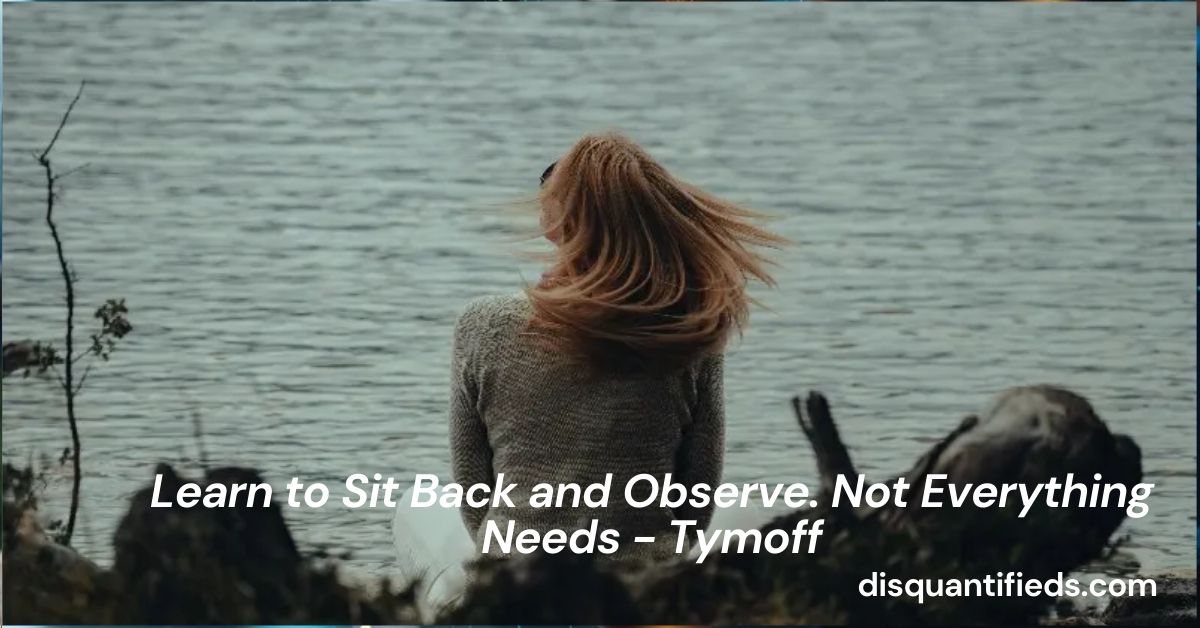Learn to Sit Back and Observe. Not Everything Needs – Tymoff
In today’s fast-paced world, where instant reactions and constant engagement are the norm, the phrase “learn to sit back and observe. not everything needs – tymoff” carries profound wisdom. It reminds us of the power of silence, observation, and restraint. This concept encourages people to pause, reflect, and resist the urge to control or respond to every situation. By adopting this mindset, we not only nurture inner peace but also make better decisions.
This article delves into the depth of this philosophy, explores its benefits, and provides actionable tips on how to implement it in everyday life.
Understanding the Meaning of “Learn to Sit Back and Observe. Not Everything Needs – Tymoff”
At its core, this philosophy invites us to embrace quiet introspection and calmness. It teaches us that:
- Not every situation requires a response: Sometimes, doing nothing is the wisest choice.
- Observing leads to better understanding: When we step back and watch without interference, we gain insights that can shape better outcomes.
- Restraint is powerful: Reacting impulsively can lead to mistakes, whereas patience and observation allow clarity.
Why Is This Philosophy Relevant Today?
In the age of social media, instant messaging, and non-stop notifications, there is immense pressure to respond immediately. Whether it’s replying to a message, reacting to news, or making decisions at work, the pace of life rarely slows down.
However, this constant engagement comes at a cost:
- Mental Overload: Too much stimuli lead to stress and burnout.
- Poor Decisions: Rushed reactions often lack thoughtfulness.
- Shallow Relationships: Overreacting to minor issues can harm personal connections.
Adopting the Tymoff philosophy helps counter these challenges, allowing individuals to live more mindfully and effectively.
Benefits of Learning to Sit Back and Observe
1. Improved Mental Clarity
Taking a step back allows your mind to process information without the pressure of immediate response. This leads to better problem-solving and decision-making.
2. Strengthened Relationships
Instead of reacting emotionally during disagreements, observing and understanding the other person’s perspective fosters healthier communication.
3. Personal Growth
Observation is a tool for self-improvement. Watching situations unfold helps you learn from others’ experiences and actions.
4. Reduced Stress
When you accept that not everything requires your intervention, you free yourself from unnecessary burdens, leading to a calmer mind.
Practical Tips to Embrace the Tymoff Philosophy
1. Practice Mindful Observation
- Start Small: Spend five minutes a day observing your surroundings without judgment.
- Stay Silent: Resist the urge to comment or intervene during conversations unless necessary.
2. Pause Before Reacting
- Count to Ten: When you feel the urge to respond impulsively, take a deep breath and count to ten.
- Ask Yourself: Is this response necessary? What will it achieve?
3. Focus on What You Can Control
- Understand that some things are beyond your influence. By focusing only on what you can control, you conserve energy and reduce frustration.
4. Develop Patience
- Patience is the backbone of this philosophy. Use techniques like meditation, journaling, or even hobbies to cultivate patience.
Real-Life Scenarios Where This Philosophy Applies
1. Workplace Challenges
When faced with criticism or conflicts at work, reacting defensively can escalate the issue. Observing first allows you to assess the situation and respond professionally.
2. Family Disputes
In personal relationships, misunderstandings often occur. Taking a step back and observing prevents unnecessary arguments.
3. Social Media
Before engaging in online debates or posting in anger, pause. Remember that not every opinion requires your counterpoint.
How This Philosophy Leads to Long-Term Happiness
Living by the principle of “learn to sit back and observe. not everything needs – tymoff” fosters:
- Inner Peace: By letting go of unnecessary battles, you create room for serenity.
- Deeper Understanding: Observation helps you uncover truths that impulsive actions might overlook.
- Resilience: You build emotional strength by staying calm in difficult situations.
The Science Behind Observation and Restraint
Psychologists have found that:
- Mindfulness reduces stress and improves focus.
- Delayed Gratification leads to long-term success, as shown in the famous Stanford marshmallow experiment.
- Emotional Regulation strengthens relationships and prevents conflicts.
These findings support the Tymoff philosophy, demonstrating its practical value in everyday life.
Misconceptions About Sitting Back and Observing
Some people misinterpret this approach as passivity or indifference. However, it’s far from that.
- Observation is Active: It involves conscious effort to understand and learn.
- Restraint is Strength: Choosing not to act impulsively is a sign of emotional maturity.
How to Stay Consistent
- Set Reminders: Place notes or digital alerts with the phrase “learn to sit back and observe. not everything needs – tymoff” to reinforce the habit.
- Surround Yourself with Calm Influences: Engage with people and environments that promote patience and understanding.
- Celebrate Small Wins: Every time you successfully observe instead of reacting, acknowledge your progress.
FAQs about Learn to Sit Back and Observe. Not Everything Needs – Tymoff
What does “learn to sit back and observe. not everything needs – tymoff” mean?
It’s a reminder to embrace patience and reflection instead of reacting to every situation. It teaches us to step back, observe, and allow events to unfold naturally.
How can I practice this philosophy in daily life?
Start with small steps like pausing before responding, observing your surroundings, and focusing on what you can control.
Why is it important to observe instead of reacting?
Observation helps you gain clarity, make better decisions, and reduce unnecessary stress. Reacting impulsively often leads to mistakes and regrets.
Is this approach suitable for all situations?
While it’s generally beneficial, there are moments (e.g., emergencies) where immediate action is required. The key is knowing when to act and when to observe.
Can this philosophy improve mental health?
Yes, by reducing stress, promoting mindfulness, and fostering a sense of control, it contributes to better mental well-being.
Final Thoughts
The phrase “learn to sit back and observe. not everything needs – tymoff” is more than just advice—it’s a way of life. In a world that demands constant action, learning to pause, reflect, and let go is a superpower. By practicing this philosophy, you not only navigate life’s challenges with grace but also create space for personal growth and happiness.
Start small. Observe. Reflect. And discover the beauty of living mindfully.






